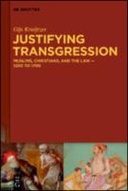Explore

How do people justify what others see as transgression? Taking that question to the Persian-Muslim and Latin-Christian worlds over the period 1200 to 1700, this book shows that people in both these worlds invested considerable energy in worrying, debating, and writing about proscribed practices. It compares how people in the two worlds came to terms with the proscriptions of sodomy, idolatry, and usury. When historians speak of the gap between premodern practice and the legal theory of the time, they tend to ignore the myriad of justifications that filled this gap. Moreover, a focus on justification evens out many of the contrasts that have been alleged to exist between the two worlds, or the Muslim and Christian worlds more generally. The similarities outweigh the differences in the ways people came to terms with the various rules of divine law. The level of flexibility of the theologians and jurists in charge of divine law varied more over time and by topic than between the two worlds. Both worlds also saw the development of ever more sophisticated justifications. Amid the increasing complexity of justifications, a particular kind of reasoning emerged: that good outcomes are more important than upholding rules for their own sake. ; How do people justify what others see as transgression? Taking that question to the Persian-Muslim and Latin-Christian worlds over the period 1200 to 1700, this book shows that people in both these worlds invested considerable energy in worrying, debating, and writing about proscribed practices. It compares how people in the two worlds came to terms with the proscriptions of sodomy, idolatry, and usury. When historians speak of the gap between premodern practice and the legal theory of the time, they tend to ignore the myriad of justifications that filled this gap. Moreover, a focus on justification evens out many of the contrasts that have been alleged to exist between the two worlds, or the Muslim and Christian worlds more generally. The similarities outweigh the differences in the ways people came to terms with the various rules of divine law. The level of flexibility of the theologians and jurists in charge of divine law varied more over time and by topic than between the two worlds. Both worlds also saw the development of ever more sophisticated justifications. Amid the increasing complexity of justifications, a particular kind of reasoning emerged: that good outcomes are more important than upholding rules for their own sake.
This book is included in DOAB.
Why read this book? Have your say.
You must be logged in to comment.
Rights Information
Are you the author or publisher of this work? If so, you can claim it as yours by registering as an Unglue.it rights holder.Downloads
This work has been downloaded 51 times via unglue.it ebook links.
- 51 - pdf (CC BY) at Unglue.it.
Keywords
- christianity
- Comparative World History
- Consequentialism
- Early history: c 500 to c 1450/1500
- Early modern history: c 1450/1500 to c 1700
- History
- History: earliest times to present day
- Humanities
- Idolatry
- Islam
- Jurisprudence & general issues
- Jurisprudence & philosophy of law
- Law
- Legal pluralism
- Medieval history
- Religion & beliefs
- Society & Social Sciences
- Sociology
- Sociology & anthropology
- Sodomy
- thema EDItEUR::3 Time period qualifiers::3K CE period up to c 1500
- thema EDItEUR::3 Time period qualifiers::3M c 1500 onwards to present day
- thema EDItEUR::J Society and Social Sciences::JH Sociology and anthropology::JHB Sociology
- thema EDItEUR::L Law::LA Jurisprudence and general issues::LAB Methods, theory and philosophy of law
- thema EDItEUR::N History and Archaeology
- thema EDItEUR::Q Philosophy and Religion::QR Religion and beliefs::QRM Christianity
- thema EDItEUR::Q Philosophy and Religion::QR Religion and beliefs::QRP Islam
- Usury
Links
DOI: 10.1515/9783111218014Editions

